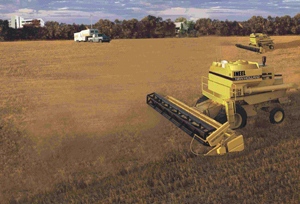 The technology is already here, but affordability, acceptance are the big questions.
The technology is already here, but affordability, acceptance are the big questions.
John Dobberstein, Associate Editor
One day, specially programmed farm tractors may pull out of a barn, do field work and then drive themselves back to the barn under their own power.
The technology to do that, called "mechatronics," has already been developed. Researchers passed the concept stage 8 years ago during tests on the University of Illinois campus.
When it's adopted into farming, mechatronics could bring new business and new demands for ag equipment dealerships, says U-I Associate Professor Qin Zhang, an internationally recognized expert on agriculture technology.
Mechatronics could be used for self-propelled sprayers, combines, planters, manure spreaders and most other agricultural equipment, says Zhang, who is leaving his post in Champaign, Ill. this summer to develop a Center for Automated Agriculture at Washington State University.
Zhang believes mechatronics could debut in U.S. agriculture in the next decade or so, but that depends on how quickly agriculture continues to modernize, and how quickly society demands the automation.
Equipment dealerships that have fully embraced precision ag will be more ready to handle mechatronics, which Zhang defines as a "combination of mechanics, electronics and information process."
Zhang says major manufacturers like Deere & Co., CNH and AGCO are interested in the technology and investigating it, and precision-ag companies like Trimble and TopCon are spending considerable resources to prepare for its arrival.
"They hope, when the need comes up, that they have something offer," says Zhang, who grew up in China on a farm, worked in a tractor factory and studied mechanical engineering in college.
Zhang believes dealerships that want to be successful selling and supporting mechatronics equipment in the future must take the time now to support equipment with electronics and automated functions.
"You can't jump from a traditional machine to mechatronics. You have to go step by step. Car dealers used to have wrenches, but now they have diagnostic tools. You used to have a screwdriver and a wrench and be able to do anything with a tractor. Today, you can do nothing with that."
Predicting Breakdowns
The term "mechatronics" was invented in the 1980s with the emergence of computer technology and electronics into the traditional equipment in the field.
The newest advancements in mechatronics have been with agricultural tractors and auto-guidance products.
Zhang says companies will eventually introduce products that automatically operate, where electronics have been integrated into the machines instead of simply being added.
When a fully autonomous system is deployed on a farm, farmers will still manage the operation, fuel the tractors, and add fertilizer, seed and implements, Zhang says this month in a published report.
He sees a fleet of machines and a master tractor leading the others in the field. The lead tractor would tackle the first 20 rows of the crop, and the second "slave" tractor will take the 20 rows behind.
A second model, Zhang says, is where 10 machines are autonomous and each works on its own as programmed.
Zhang says it would be easy to service this type of equipment because of prognostic technology, computing power on the machine, and process sensors that access the condition of the machine.
"Equipment breakdowns will be predicted and a signal will be sent to a dealer or service center to tell what machine will have what problem in how many hours," he says. "The system informs both the dealer and the owner to schedule maintenance."
The obstacles to mechatronics, he says, are "legal and economic," since in some states it isn't legal to run a tractor without an operator. And it must be affordable, with lower-cost components than have been used in research.
Mechatronics would likely appeal to operators of large farms. And it might solve a vexing problem: Many young people coming up in the field don't want to stay on the farm and do all the work, Zhang says.
"The herbicide and nitrogen application, the decision-making and the implementation all take time and knowledge, as well as hands to do it," he says.
"Farmers may need to drive a tractor 8 hours a day for 90 days during the growing season. Do they pay close attention all that time? I would say it's nearly impossible. This is why I see farm machinery definitely moving to the mechatronics area."





